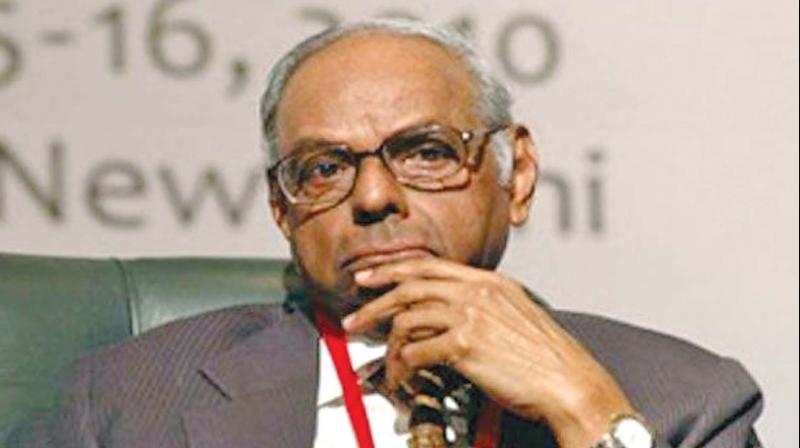Retain a few banks under control, privatise rest: Former RBI governor

Chennai: Former RBI governor C. Rangarajan has advised the government to retain a few public sector banks under its control and allow the rest to be privatised.
Averring that one of the objectives of the reforms is to improve the efficiency of the banking system, he said: “government could keep key banks under its control by providing adequate capital and allow others to be privatised.”
Speaking at the inaugural of the one-day international conference on Finance and Economics 2017 at Loyola Institute of Business Administration (Liba), here on Friday, he said this may seem a difficult task.
“Let’s make the available capital to strengthen few limited banks in the interest of the country,” he said. Contending that banking system required radical changes, Mr Rangarajan said that he was taking a pragmatic view. “If the public sector banks have to expand their activities, the state could provide 51 % of the additional capital requirement. This will put a limit on how much capital the government can put in,” he said.
Mr Rangarajan suggested resorting to some kind of “hair cut” to resolve the problem. “If you insist upon the borrower to return everything, it may not happen. But it can be done in a manner in which you can at least recover a major portion of the loans,” he said.
Turning to larger issues, Mr Rangarajan said in a growing country like ours, India needs more and new financial products — though anything in excess is dangerous. Fewer regulations lead to financial instability while too much will come in the way of innovations. So, the nation should strike an appropriate balance between the need for financial innovation to obtain the growth and need for regulation. What India needs is growth with stability, he emphasised.
Later, responding to former RBI governor Raghuram Rajan’s comments on the decline in growth, Mr Rangarajan said there has been a decline in growth rate recently, due to some temporary measures and some underlying trends that pulled down the growth of Indian economy.
“The US is not talking about two per cent growth rate. Even though our growth rate has come down, it is still higher than other countries. This needs to be increased,” he said.
Demonetisation has limitations, gain in future is uncertain: Rangarajan
Demonetisation could have been more effective had authorities were better prepared. But despite the controversies, it did send shivers down the spine of many and its future gain is uncertain though, opined C. Rangarajan former Governor of RBI. He contended that demonetisation as an instrument for curbing or restraining unaccounted income held in the form of cash is accepted. But its limitations should also be understood, he contended.
“It deals with unaccounted money in the form of cash and does not do anything unaccounted in the form of gold or land. The first problem is we have no idea how much of unaccounted money in cash is,” Mr. Rangarajan said.
He was speaking during an interaction at the inaugural of one-day international conference on Finance and Economics 2017 held at Loyola Institute of Business Administration (LIBA), here on Fri-
day.
He said though it is pointed out that about 10 to 15 per cent of money in circulation is less on account of demonetisation, it is unfortunate that the pain “is now and the gain is in future, uncertain.”
Demonetisation, Mr. Rangarajan said, by itself could not prevent further accumulation of unaccounted money in cash or black money.
“The point really is much of the controversy could have been avoided if the authorities had been prepared. If on day one of implementing demonetisation, had the authorities had enough currency at their disposal to exchange the old notes with new currency, much of the problems and sufferings of the vulnerable groups could have been avoided,” he said.
But due to the state of unpreparedness, they gave two months time for exchange of old notes. And two months were too long a period for many things to be done, he added.
On a positive note, the demonetisation has minimised the use of cash and encouraged people to opt for digital payment which is becoming more common now.

